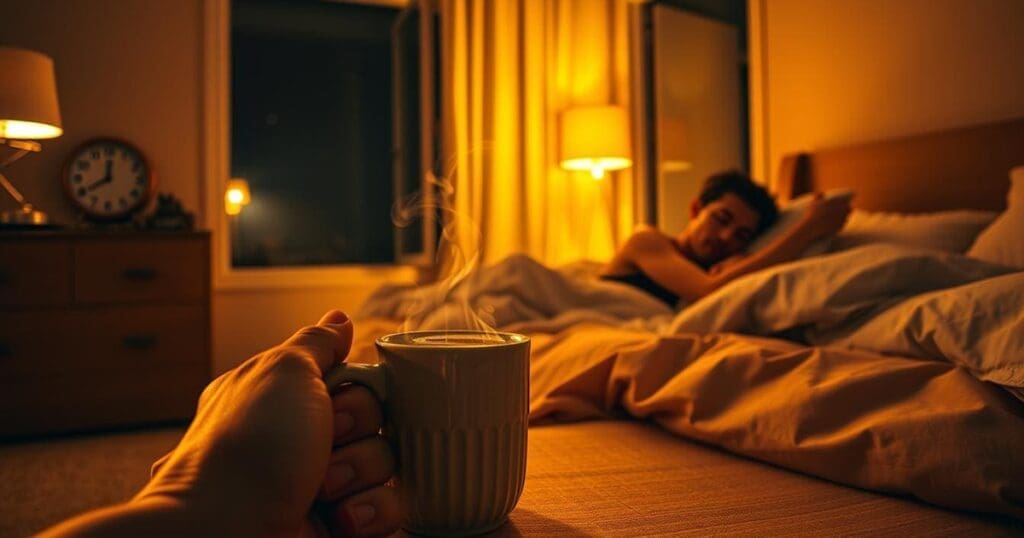Most American adults drink caffeine every day. This makes us wonder, how does coffee affect our sleep? It’s important to understand how coffee and sleep are connected. This knowledge helps us find a good balance.
The U.S. average caffeine intake is 200 mg a day. But, it can vary from 154 mg to 1285 mg. This difference affects how coffee impacts sleep for each person.
Caffeine lowers 6-sulfatoxymelatonin levels, which can disrupt sleep. A study showed that 400 mg of caffeine 6 hours before bed can mess up sleep. So, how can we enjoy coffee without ruining our sleep?
By learning about coffee’s effects on sleep, we can improve our sleep routine. This leads to better sleep quality and a healthier coffee habit.
The Science Behind Caffeine and Sleep
Caffeine is a popular stimulant that can affect sleep quality. To grasp how caffeine impacts sleep, we need to explore its science. It works by blocking adenosine, a chemical that makes us tired. This action increases alertness and wakefulness.
Drinking caffeine doesn’t just block adenosine receptors. It also messes with our natural sleep-wake cycle. Studies reveal that more than 6 grains (about 390 mg) of caffeine can disrupt sleep for most people. Also, 200 mg of caffeine in the evening can delay melatonin by about 40 minutes.
What Happens to the Body After Caffeine Consumption
After drinking caffeine, our body goes through changes. Caffeine binds well to A1 and A2A adenosine receptors, which control sleep and wakefulness. This binding makes us feel more awake but can also harm sleep quality and reduce sleep efficiency.
The Role of Adenosine in Sleep Regulation
Adenosine is key in managing sleep. When we’re tired, more adenosine is released, making us feel even sleepier. Caffeine blocks these receptors, fighting off tiredness. To balance coffee consumption and keep sleep quality good, knowing how caffeine and adenosine interact is vital.
How Caffeine Impacts Sleep Quality
Caffeine can really mess with your sleep, causing sleep problems. Studies show it can mess up your sleep patterns, mainly if you drink a lot or too close to bedtime. This can lead to not getting enough sleep, affecting how well you think and feel.
Finding the right balance between caffeine and sleep is key. Regular physical activity and balanced meals can help you not rely so much on caffeine. Also, stopping caffeine before bed can help you sleep better.

How caffeine affects sleep varies from person to person. Paying attention to how your body reacts can help you manage caffeine better. Knowing how caffeine impacts sleep can help you improve your sleep and overall health.
Being careful with caffeine, specially in the late afternoon, is important. It can make it hard to fall asleep or keep you awake at night. Finding a caffeine plan that works for you can lead to better sleep and health.
Timing: Finding the Right Moment for Coffee
Timing is key when it comes to drinking coffee. Reducing coffee before bedtime is important for a good night’s sleep. Studies show that coffee within six hours of bedtime can mess up sleep patterns. Caffeine stays in your system for hours, impacting sleep quality.
Most people drink coffee right after waking up, with 1 to 3 cups being common. It’s best to wait 1 to 2 hours after waking to have your first cup. This lets your body use its own energy first, improving sleep.
Drinking coffee at the right time boosts energy and alertness. It’s wise to stop coffee after 3 p.m. to avoid sleep cycle disruption. This helps maintain energy the next day. By understanding timing’s impact on sleep, you can adjust your coffee habits for better sleep and energy.
Caffeine Sensitivity: Individual Differences
Managing coffee intake for better sleep depends a lot on individual differences. Research shows that genetics and metabolism can change how caffeine affects sleep. For example, a study found that certain genetic variations in the ADORA2A gene affect sleep in low caffeine users.
Age, sex, and other drug use also play a role in the coffee and insomnia connection. Older adults might be more sensitive to caffeine’s sleep effects than younger ones. Women might also have poorer sleep quality due to caffeine dependence. It’s key to consider these factors when figuring out your caffeine sensitivity and adjusting your coffee intake.

Understanding your own caffeine sensitivity can help you adjust your coffee habits. This might mean drinking coffee only at certain times or drinking less overall. By doing this, you can better manage your coffee intake for better sleep and avoid the negative effects of coffee and insomnia.
Alternatives to Coffee for Energy Boosts
Looking to cut down on coffee? There are many alternatives that can give you a boost. Herbal teas, for example, are caffeine-free and packed with health benefits. Green tea has about 30 to 50 milligrams of caffeine per 8-ounce serving. It’s perfect for those who want to limit their caffeine.
Raw cacao is another great option. It has much less caffeine than coffee. This makes it ideal for those who are sensitive to caffeine but want a drink to energize them. Adding these alternatives to your daily routine can help improve your health and wellbeing.
There are more natural ways to boost your energy. By following tips for balancing coffee consumption, you can reduce your coffee intake. Simple changes like regular exercise and good sleep hygiene can also help. These changes can increase your energy and reduce the need for coffee.
Exploring these alternatives and making small changes can greatly improve your health. It can lead to better sleep hygiene and coffee consumption habits. Plus, you’ll have more energy and lower the risk of coffee’s negative side effects.
Recognizing Signs of Caffeine Overconsumption
Caffeine is a common part of our daily lives, with most adults around the world drinking it every day. But too much caffeine can disrupt sleep, linking coffee to insomnia. It’s important to know the signs of too much caffeine to avoid its negative effects.
Look out for physical signs like jitteriness and anxiety, which can happen when you have too much caffeine.  You might also feel mood swings and get easily irritated. These symptoms can really affect your daily life, so it’s key to notice them.
You might also feel mood swings and get easily irritated. These symptoms can really affect your daily life, so it’s key to notice them.
Physical Symptoms to Watch Out For
Caffeine stays in your system for about ten hours, and its effects can last even longer. The FDA says you shouldn’t have more than 400 mg of caffeine a day, which is like drinking four cups of coffee. Taking in more than this can cause serious problems, like trouble breathing, vomiting, and even hallucinations.
Emotional and Mental Effects
Caffeine can cut down your sleep time by 45 minutes and make your sleep less efficient by 7 percent. This shows how coffee can affect your sleep. It’s important to watch how much caffeine you have, avoiding it in the afternoon and evening to keep your sleep good. By knowing the signs of too much caffeine, you can cut down on it and stay healthy.
Strategies for Balancing Coffee Intake
Coffee is a big part of many people’s lives, helping them stay awake and focused. But, it’s important to watch how much coffee we drink to sleep better. Reducing coffee before bedtime is a simple way to get better sleep. It helps avoid disrupting our sleep patterns.
Studies show that being careful with coffee timing and amount is key. With 70% of people drinking coffee weekly, finding a balance is vital. This might mean reducing coffee before bedtime or trying other energy boosters like a walk or stretching.
By using these strategies, we can enjoy coffee without sacrificing sleep. It’s about finding a balance that fits our lifestyle and preferences. Being mindful of coffee intake and reducing coffee before bedtime helps us wake up feeling refreshed and ready for the day.
Creating a Balanced Routine
Getting a consistent sleep schedule is key to better sleep. By focusing on sleep hygiene and coffee consumption, you can make a routine that helps you rest well. It’s important to watch how much coffee you drink to keep your sleep patterns steady.
Studies show that 70% of people drink coffee weekly, and 62% do it daily. Knowing the right time to stop drinking coffee is important. It should be at least 6 to 8 hours before bedtime. By adding sleep-friendly habits and being careful with coffee consumption, you can sleep better.
Incorporating Sleep-Friendly Habits
Starting a calming bedtime routine tells your body it’s time to sleep. This can be reading, meditation, or a warm bath. A regular sleep schedule and a sleep-friendly environment can also help you sleep better.
Mindfulness and Relaxation Techniques
Mindfulness and relaxation, like deep breathing and muscle relaxation, can lower stress and help you sleep. Adding these to your daily routine can make your sleep and overall health better.
The Role of Hydration in Caffeine Consumption
Understanding hydration is key when managing coffee for better sleep. Coffee can make you urinate more, leading to dehydration if not balanced with water. Dehydration can worsen sleep problems, linking coffee to insomnia.
It’s important to stay hydrated to counteract caffeine’s effects. Drinking at least 8 glasses of water a day can offset coffee’s diuretic impact. Also, make sure your fluid intake is more than your caffeinated drinks to keep hydrated.
Studies show that moderate coffee drinking doesn’t cause dehydration in everyday life. But, factors like climate, activity level, and health can change hydration needs. By focusing on hydration and coffee’s diuretic effects, you can improve sleep and health.
Debunking Common Myths about Caffeine and Sleep
Many think their body gets used to caffeine over time. But this isn’t true. Caffeine can disrupt sleep, and its link to coffee and insomnia is clear. Drinking coffee in the afternoon or evening can make it hard to fall or stay asleep.
The connection between coffee and insomnia is complex. It depends on how sensitive you are to caffeine and your sleep habits. Some people get sleep problems from caffeine, even in small amounts. Knowing how coffee and insomnia are linked can help you make better choices about your coffee and sleep.
Another myth is that decaf coffee has no caffeine. But it’s not completely caffeine-free. Decaf coffee has less caffeine than regular coffee but can have some. This is a problem for those who are very sensitive to caffeine or have trouble sleeping because of it. Learning the truth about caffeine and sleep can help you avoid sleep problems and improve your health.
Conclusion: Crafting Your Perfect Coffee Routine
Starting your journey to balance coffee and sleep is important. Everyone’s body reacts differently to caffeine. So, what works for one might not work for another.
Assessing Your Personal Needs
Look at how much coffee you drink and how it affects your sleep. Notice when you drink coffee, how much, and any feelings it causes. A caffeine diary can help you see how your body reacts and find your limits.
Embracing a Mindful Approach to Caffeine
Being mindful with caffeine is key to a healthy coffee habit. Listen to your body and make choices about when and how much to drink. This way, you can manage your coffee intake for better sleep and feel better overall.




Facebook Comments